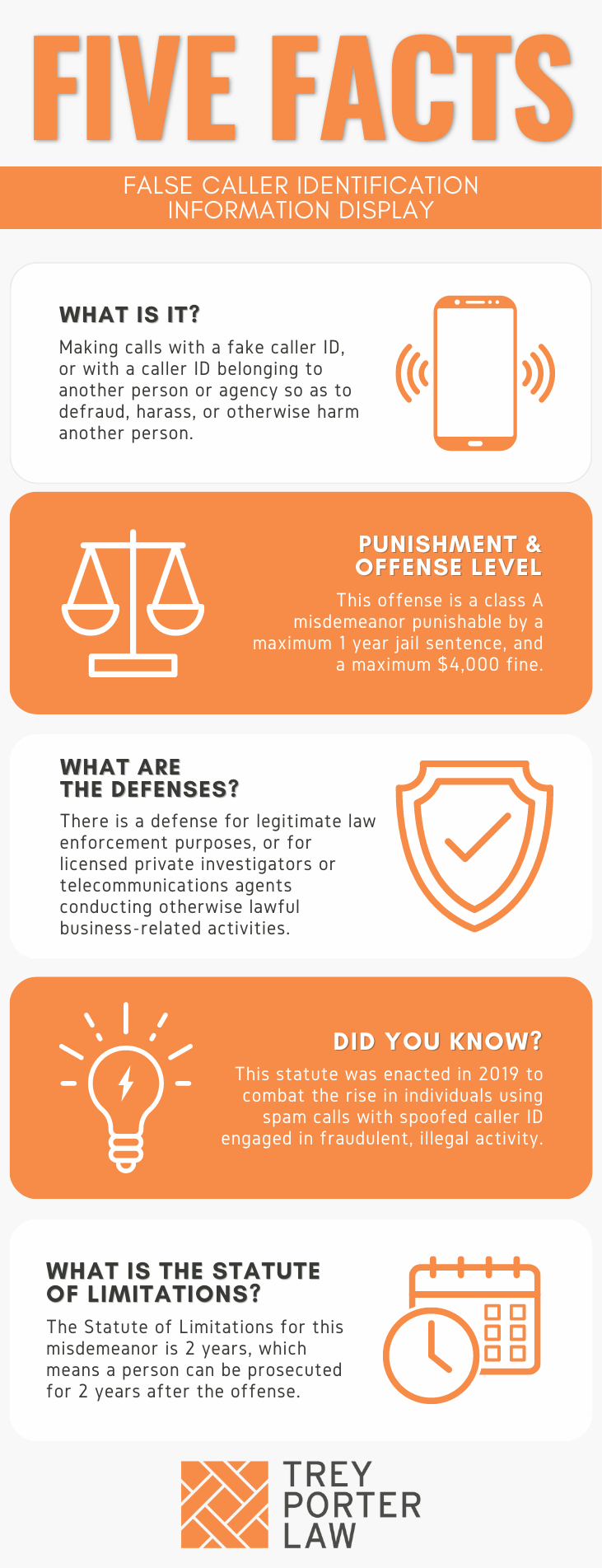WHAT IS FALSE CALLER IDENTIFICATION INFORMATION DISPLAY IN TEXAS?
The Texas law against false caller identification information display prohibits caller ID spoofing, or making calls showing a number different from that under which the call was placed with the intent to defraud, harass, or cause harm to another.
WHAT IS THE FALSE CALLER IDENTIFICATION INFORMATION DISPLAY LAW IN TEXAS?
Tex. Penal Code § 33A.051. FALSE CALLER IDENTIFICATION INFORMATION.
(a) A person commits an offense if the person, with the intent to defraud or cause harm, makes a call or engages in any other conduct using any type of technology that results in the display on another person’s telecommunications device of data that misrepresents the actor’s identity or telephone number.
(b) An offense under this section is a Class A misdemeanor.
(c) Notwithstanding any other provision of this chapter, a conviction for an offense under this section may not be used for enhancement purposes under any other section of this chapter.
(d) It is a defense to prosecution that the actor:
(1) blocked caller identification information;
(2) was a peace officer or federal law enforcement officer lawfully discharging an official duty;
(3) was an officer, agent, or employee of a federal intelligence or security agency lawfully discharging an official duty;
(4) was an officer, agent, or employee of a telecommunications service provider who was:
(A) acting in the provider’s capacity as an intermediary for the transmission of telephone service, a Voice over Internet Protocol transmission, or another type of telecommunications transmission between the caller and the recipient;
(B) providing or configuring a service or service feature as requested by a customer;
(C) acting in a manner that is authorized or required by other law; or
(D) engaging in other conduct that is a necessary incident to the provision of service; or
(5) was a private investigator licensed under Chapter 1702, Occupations Code, lawfully conducting an investigation.
(e) For the purposes of this section, “telecommunications service provider” means a:
(1) telecommunications provider, as defined by Section 51.002, Utilities Code; or
(2) provider of telecommunications service, advanced communications services, or information service, as those terms are defined by 47 U.S.C. Section 153.
WHAT IS THE PENALTY CLASS FOR FALSE CALLER IDENTIFICATION INFORMATION DISPLAY IN TEXAS?
False caller identification information display is a Class A misdemeanor, punishable by up to one year in county jail.
WHAT IS THE PUNISHMENT RANGE FOR FALSE CALLER IDENTIFICATION INFORMATION DISPLAY IN TEXAS?
The punishment range for false caller identification information display is up to one year in jail, and a maximum $4,000 fine.
WHAT ARE THE PENALTIES FOR FALSE CALLER IDENTIFICATION INFORMATION DISPLAY IN TEXAS?
A person charged with false caller identification information display may be eligible for probation after a conviction, or deferred adjudication without a conviction, for a period not to exceed two years.
WHAT ARE THE DEFENSES TO FALSE CALLER IDENTIFICATION INFORMATION DISPLAY IN TEXAS?
The statute authorizes defenses to false caller identification information display. A person accused thereof may assert the conduct was lawful if the person:
- blocked the caller identification information;
- was lawfully discharging an official duty as a peace officer, federal law enforcement officer, or an officer, agent, or employee of a federal intelligence or security agency;
- was a licensed private investigator lawfully conducting an investigation; or
- was acting as an agent, employee, or officer of a telecommunications service provider, and was:
- providing or configuring a service as requested by a customer;
- acting as an intermediary for transmission of a telephone service, Voice over Internet Protocol transmission, or other type of telecommunications transmission between the caller and recipient; or
- engaging in other conduct necessary to provide service or authorized or required by law.
WHAT IS THE STATUTE OF LIMITATIONS FOR FALSE CALLER IDENTIFICATION INFORMATION DISPLAY IN TEXAS?
The limitation period for false caller identification information display is two years.
FALSE CALLER IDENTIFICATION INFORMATION DISPLAY IN TEXAS
Caller identification spoofing became a Texas crime in 2019 in response to the increased volume in people making these calls with the intent to defraud, harass, or cause harm to others.













